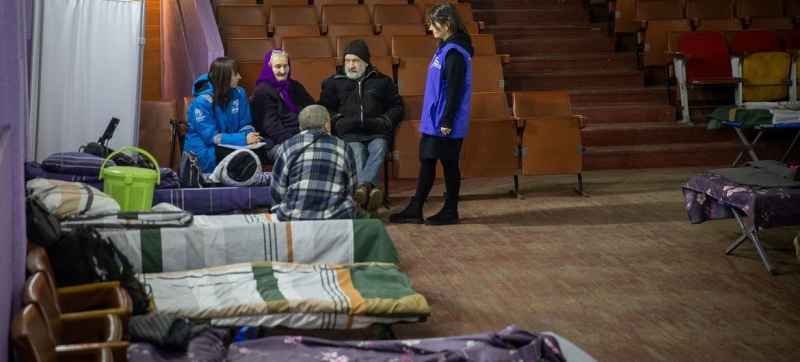- UNGA urges renewed int’l efforts for a resolution of Rohingya crisis |
- First National AI Readiness Assessment Report Published |
- China calls for implementation roadmap for new finance goal |
- New gas reserve found in old well at Sylhet Kailashtila field |
- Revenue earnings shortfall widens in October |
Ukraine’s Frontline Evacuations Rise as War Intensifies

Newly displaced from Donetsk region of Ukraine receive support at transit hub.
The lives of people living on Ukraine’s frontline with Russia are becoming increasingly precarious, with support now being provided to those who wish to evacuate as well as those who choose to remain in their homes.
In the past year alone, more than 250,000 residents have left the Donetsk region, a major focus of Russian attacks in southeastern Ukraine near the shared border. Evacuations are also under way in neighbouring Dnipropetrovsk, Kharkiv, Sumy, and Zaporizhzhia.
The UN refugee agency, UNHCR, is supporting both evacuees and those who stay behind. Federico Sersale, head of UNHCR’s office in Dnipro, told UN News that most of those who remain are elderly or have disabilities. Some are unwilling to leave, fearing they may never return, while others are unable to evacuate without assistance.
A difficult decision
People who remain in frontline areas endure harsh and extremely stressful conditions, facing constant attacks and disruptions to basic services. Their movements are limited by the security situation, and persuading them to leave remains a major challenge.
“I think the most important thing is that it’s their decision whether to leave or stay. What we try to do, as far as possible, is to give them the information to make an informed decision,” Mr Sersale said.
Assisting evacuees and frontline communities
In the meantime, UNHCR and its NGO partners are providing essential support.
“When we have access to those communities, we provide various services and assistance – from basic relief items like blankets to shelter materials and repair kits for homes damaged by airstrikes, as well as psychosocial support and legal aid.”
The most vulnerable evacuees pass through transit sites—government-led facilities where they stay briefly, receive basic services, and then move onward.
“Forty-six per cent of the people who have passed through transit sites are either older people or people with limited mobility. That is a new development,” Mr Sersale noted.
“We help set up these sites, provide basic equipment like beds, blankets, and washing machines, and offer services including psychosocial and legal aid, along with cash assistance to cover urgent needs. It varies depending on the gaps.”
Frontline holdouts
Svitlana, an elderly woman from a frontline community in the Zaporizhzhia region, passed through one such transit site south of Dnipro City. Although encouraged to leave earlier, she and her husband refused, living without electricity and with drones constantly flying overhead.
When the frontline shifted and conditions deteriorated a few weeks ago, she finally decided to leave.
After spending a few days at the transit centre, receiving cash and other assistance, she was moved to “An Ocean of Kindness” in Dnipro City, a UNHCR-supported facility offering temporary accommodation for internally displaced people (IDPs) with mobility challenges.
“That’s where I met her,” Mr Sersale said. “It’s a temporary solution. She’s waiting to find longer-term accommodation.”
Despite everything she had endured, he recalled, “her eyes were still full of hope and energy.”
Long-term solutions and resilience
One of the biggest challenges for vulnerable IDPs like Svitlana is gaining access to long-term solutions, including permanent housing and continued care.
“This could mean an assisted living facility, receiving home-based care, or living independently with support services,” Mr Sersale explained. “Housing for internally displaced people is one of the main gaps, and we are actively working on this alongside our emergency response.”
As Svitlana explores long-term options, UNHCR continues to support her and other IDPs.
“I think her story is a perfect example of what life on the frontline is like. You must make a difficult decision about whether to leave, and then find the resilience to start again.”

